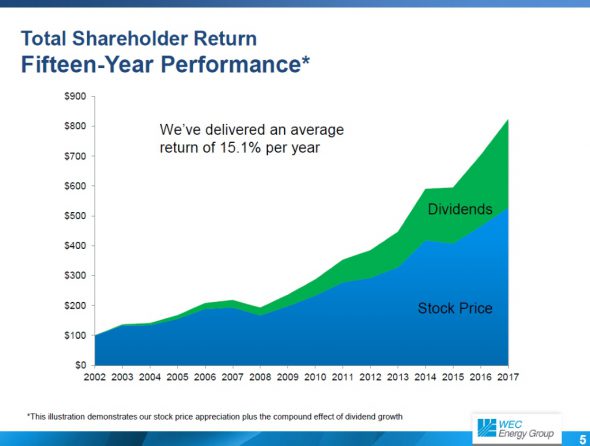The Many Ads of We Energies
They’d rather spend on ads to make the company look good than lower your rates.
The exact details aren’t clear, but over the years the 15 members of the board of directors of WEC Energy Group, parent company of We Energies, have given the okay for the company to purchase ads around town to buff up its brand. Precisely how much it’s spending is unknown, because the company refuses to say. You might think that a publicly regulated utility would be required to reveal this information, but you’d be wrong.
This advertising — or “sponsorship” as the company prefers to call it — is quite wide-ranging. “We believe it’s important to support community organizations and businesses in our service area,” says company spokesperson Brendan Conway, “which bring an economic benefit to the communities we serve and contribute to our quality of life.”
That includes just about any sports team you can think of, including the Milwaukee Bucks and Brewers, Green Bay Packers, Milwaukee Admirals, and the various teams fielded by UW-Milwaukee and Marquette University. They all carry We Energies ads.
“They advertise during men’s and women’s games at the Klotsche Center and (downtown) UWM Panther Arena,” says Tom Luljak, vice chancellor of University Relations & Communications. That includes at soccer and baseball games, but there’s a “particular emphasis” on basketball, he adds — Panthers basketball is UWM’s most high profile sport.
We Energies has been advertising with the Milwaukee Admirals “for as long as I can remember, a dozen to 15 years,” says Charlie Larson, the team’s V-P of communications. As for how much the utility spends, he couldn’t reveal that, but suggested I check with We Energies since it’s a “public company.” Sorry, Charlie, they’re not public about that.
Larson did say the contract with the Admirals was relatively modest, though quite important to the team. “Compared to what they do with the Bucks and Brewers it’s not a lot.”
Just how big those Bucks and Brewers ad buys are shall remain a secret, too, as neither team, though each gets a huge subsidy from taxpayers, responded to a request for this information.
Conway hastens to note that the money for all these ads with sports teams doesn’t come from the ratepayers — and thus is not subject to state regulation — but from the shareholders. But of course the shareholders return comes from revenue earned by the company, which comes from rate payers.
The company’s online explanation of “Why we advertise” elicited this comment from someone called “Jeff”: “Your nose must have been growing longer and longer as you wrote this article… If ‘stockholders’ are comfortable with the lower returns, then they should be just as comfortable with using the advertising costs to reduce customer rates rather than increasing their returns. When you operate in a monopoly you should have no right to waste our money with your garbage advertisements.”
One reason stockholders might be comfortable giving up some of their return is because it’s been such a windfall: As the company has bragged in a presentation to shareholders, the value of WEC Energy Group stock has gone up by 724 percent over the last 15 years, nearly twice as high as high as average utilities, which rose by 374 percent (as measured by the Philadelphia Utility Index), and far faster than the booming Dow Jones Industrial Index, which rose by a bullish 493 percent during that period. “We’ve delivered an average return of 15.1% per year,” the company crows.
That 724 percent return is 19.5 times higher than the inflation rate of 37 percent during that period of time.
Meanwhile the company’s top executives made nearly $30 million annually over the last three years, with longtime CEO Gale Klappa earning $13.8 million in 2015.
How can the company’s execs and shareholders get such a rich return? Because of the ever higher electric rates it charges. The rates have risen by 79 percent since 2001, “twice the cost of living,” according to Tom Content of the Citizens Utility Board, a watchdog group for consumers which tracks utilities in the state.
Conway counters that the the company’s electric rates “have been frozen since 2016,” but Content notes those rates are among the highest in the Midwest and that “hasn’t budged from the same ranking two years ago.”
Nor are consumers the only ones facing high rates. In 2016, the Wisconsin Industrial Energy Group (WIEG) another watchdog group on electric rates, representing more than 30 of the state’s largest companies, joined with the Wisconsin Paper Council to issue an 18-page statement assailing the state’s electric utilities, as the Wisconsin State Journal reported. “Not only did Wisconsin have the highest average industrial rate when compared to surrounding states, the Midwest and U.S. averages respectively, but the growth rate from 2001 to 2015 was the highest as well,” the report noted. It could result in state companies “expanding or relocating in states with greater market access and/or much lower rates,” the statement said.
WIEG released a recent report showing We Energies’ industrial electric rate is 22 percent higher than the average Midwestern rate and 23 percent higher than the average national rate.
These costs are paid by all of us and fall hardest on the poor. Back in 2007, a study by the UW-Milwaukee Employment & Training Institute found the average cost of heat and electricity for the city’s renters nearly doubled in six years, rising from $1,318 in 2000 to $2,227 in 2006.
Small wonder the shareholders of WEC Energy Group feel they need to spend on advertising. The ads aren’t urging us to buy from We Energies, as they are a monopoly and our only choice. No, they are meant to make us feel better about a utility with some of the nation’s highest electric rates and most richly rewarded stockholders.
Years ago, notes a longtime observer of We Energies, the ads bragged that the company’s rates were lower than the national average. But that hasn’t been true for more than a decade. Now the ad is about trustworthiness: “People you can trust. Energy you can rely on.”
And a rate of return that can’t be beat.
If you think stories like this are important, become a member of Urban Milwaukee and help support real independent journalism. Plus you get some cool added benefits, all detailed here.
Murphy's Law
-
National Media Discovers Mayor Johnson
 Jul 16th, 2024 by Bruce Murphy
Jul 16th, 2024 by Bruce Murphy
-
Milwaukee Arts Groups in Big Trouble
 Jul 10th, 2024 by Bruce Murphy
Jul 10th, 2024 by Bruce Murphy
-
The Plague of Rising Health Care Costs
 Jul 8th, 2024 by Bruce Murphy
Jul 8th, 2024 by Bruce Murphy
























From the PSC web page:
The Public Service Commission of Wisconsin (PSC) is composed of three full-time Commissioners who decide the cases brought to the PSC for changes in utility operations, rates and for construction projects after a complete and thorough review of all the records compiled in the case, including public comments. Commissioners are appointed by the Governor and confirmed by the State Senate for staggered, six-year terms.
One of these Commissioners is appointed chairperson by the Governor for a two-year term.
I wonder how many board members of WE Energies are former PSC commissioners?
This is not only a monopoly, the PSC also guarantees them a profit.
Bruce, you’ve focused on one of the most irritating aspects of life in Wisconsin. Please don’t let up.